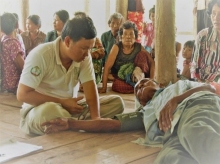Researching sustainable primary care in Cambodia

January 2019 to September 2022
Lead research institution: Duke-NUS Medical School and KHANA Centre for Population Health Research, Cambodia
Other participating research institutions: Ministry of Health, Cambodia
Principal investigators: Dr David Bruce Matchar, Duke-NUS Medical School and Dr Siyan Yi, KHANA Centre for Population Health Research, Cambodia
Cambodia
Background
Populations around the world are ageing rapidly and accompanying this is a rise in the prevalence of non-communicable diseases (NCDs). Progress towards Universal Health Coverage (UHC) could be accelerated by adopting affordable and sustainable service delivery models that attend to NCDs and their risk factors, so that NCD-related disability and morbidity are managed.
Economic development, together with health reforms since the early 1990s, have resulted in substantial gains in life expectancy in Cambodia. However, while total mortality has decreased over the last 15 years, the number as well as the proportion of death and disability due to NCDs has risen steeply.
National strategic and multi-stakeholder plans for the prevention and control of NCDs in Cambodia have highlighted the role of commune-level health centres serving as the nexus of primary health services. However, at present, health centres have limited experience in providing NCD services, with most visits being related to maternal and child health, communicable diseases and basic health education and promotion services. Further, while there have been efforts to provide guidance on establishing NCD services at health centres, such activities need to be tailored to the local context.
Goal
To contribute to a functioning and sustainable primary care system in Siem Reap province.
Methods
- Assessed current capacity and key barriers faced in providing NCD services through a survey of representative primary care sites in the Siem Reap province. A “readiness” index was constructed to assess the level of resources available to provide basic prevention and treatment services for hypertension and type 2 diabetes. Facility readiness was measured and averaged across five domains: basic equipment, essential services, diagnostic capacity, counselling services and essential medicines.
- Developed tools for providing NCD services in primary care sites informed by the survey results and international literature review. Tailored it to the local context in consultation with key stakeholders including representatives of the Ministry of Health, the Siem Reap Provincial Health Department, commune-level health centres and non‐profit organisations working to improve NCD care in Cambodia.
Results
- None of the surveyed primary care health centres reached a readiness score of 70%, a benchmark threshold value used in other similar studies. Health centres who had received prior training on NCD care reported on average higher scores than those who had not.
- Tools for the management of chronic NCDs were developed to help staff at primary care‐level health centres in Cambodia assess, counsel, treat and manage patients with hypertension and diabetes.
Global implications
Strengthening the function and capacity of the primary care system to provide NCD care can serve as the first step toward a more comprehensive and sustainable health system in the context of population aging in low- and middle-income countries. This allows health workers at all levels of the system to be integrated into the care pathway for chronic NCDs.
Local implications
Experience from the Kansai region in managing chronic conditions is important to share with other countries that need to adapt their health systems from treating infectious diseases to managing chronic conditions.
Publications
Sivapragasam, N., Matchar, D.B., Chhoun, P. et al. Developing a toolkit for implementing evidence-based guidelines to manage hypertension and diabetes in Cambodia: a descriptive case study. Health Res Policy Sys 20 (Suppl 1), 109 (2022). https://doi.org/10.1186/s12961-022-00912-4
(under preparation)
Assessing readiness to manage NCDs at the primary care level: Findings from a survey of health centres in Cambodia
A scoping review to describe primary care interventions for non‐communicable diseases and associated tools in low‐resource settings

